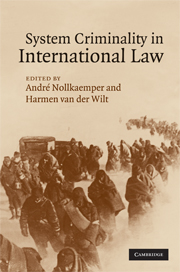Book contents
- Frontmatter
- Contents
- Preface
- Table of cases
- Table of treaties and international instruments
- List of abbreviations
- List of contributors
- 1 Introduction
- 2 The policy context of international crimes
- 3 Why corporations kill and get away with it: the failure of law to cope with crime in organizations
- 4 Men and abstract entities: individual responsibility and collective guilt in international criminal law
- 5 A historical perspective: from collective to individual responsibility and back
- 6 Command responsibility and Organisationsherrschaft: ways of attributing international crimes to the ‘most responsible’
- 7 Joint criminal enterprise and functional perpetration
- 8 System criminality at the ICTY
- 9 Criminality of organizations under international law
- 10 Criminality of organizations: lessons from domestic law – a comparative perspective
- 11 The collective accountability of organized armed groups for system crimes
- 12 Assumptions and presuppositions: state responsibility for system crimes
- 13 State responsibility for international crimes
- 14 Responses of political organs to crimes by states
- 15 Conclusions and outlook
- Index
1 - Introduction
Published online by Cambridge University Press: 08 October 2009
- Frontmatter
- Contents
- Preface
- Table of cases
- Table of treaties and international instruments
- List of abbreviations
- List of contributors
- 1 Introduction
- 2 The policy context of international crimes
- 3 Why corporations kill and get away with it: the failure of law to cope with crime in organizations
- 4 Men and abstract entities: individual responsibility and collective guilt in international criminal law
- 5 A historical perspective: from collective to individual responsibility and back
- 6 Command responsibility and Organisationsherrschaft: ways of attributing international crimes to the ‘most responsible’
- 7 Joint criminal enterprise and functional perpetration
- 8 System criminality at the ICTY
- 9 Criminality of organizations under international law
- 10 Criminality of organizations: lessons from domestic law – a comparative perspective
- 11 The collective accountability of organized armed groups for system crimes
- 12 Assumptions and presuppositions: state responsibility for system crimes
- 13 State responsibility for international crimes
- 14 Responses of political organs to crimes by states
- 15 Conclusions and outlook
- Index
Summary
This book reviews the main legal avenues that are available within the international legal order to address the increasingly important problem of system criminality, and to identify the need and possibilities for improving such avenues.
The term system criminality refers to the phenomenon that international crimes – notably crimes against humanity, genocide and war crimes – are often caused by collective entities in which the individual authors of these acts are embedded. Notable examples of situations of system criminality after the Second World War include the ‘dirty war’ in Argentina in the 1970s and 1980s, the atrocities committed during the Balkan Wars of the early 1990s of the previous century, in which states and organized armed groups played a dominant role, and the crimes committed during the ongoing armed conflicts in the Darfur area in Sudan.
While in many situations of system criminality the legal response of the international community has focused on individual perpetrators, who for instance have been the subject of criminal proceedings at the ICTY, ICTR, ICC or domestic courts, such individuals were often small cogs in larger systems that may be beyond the reach of individual responsibility. With regard to the international crimes committed in Darfur, for example, the Prosecutor of the ICC has indicted two individuals whom he thought were responsible for international crimes. But it is hard to believe that Ahmad Muhammed Harum, former Minister of State for the Interior of the Government of Sudan, was, on his own, responsible for the crimes that have been committed in Sudan, or even for the crimes in respect of which he was charged.
- Type
- Chapter
- Information
- System Criminality in International Law , pp. 1 - 25Publisher: Cambridge University PressPrint publication year: 2009
- 10
- Cited by



